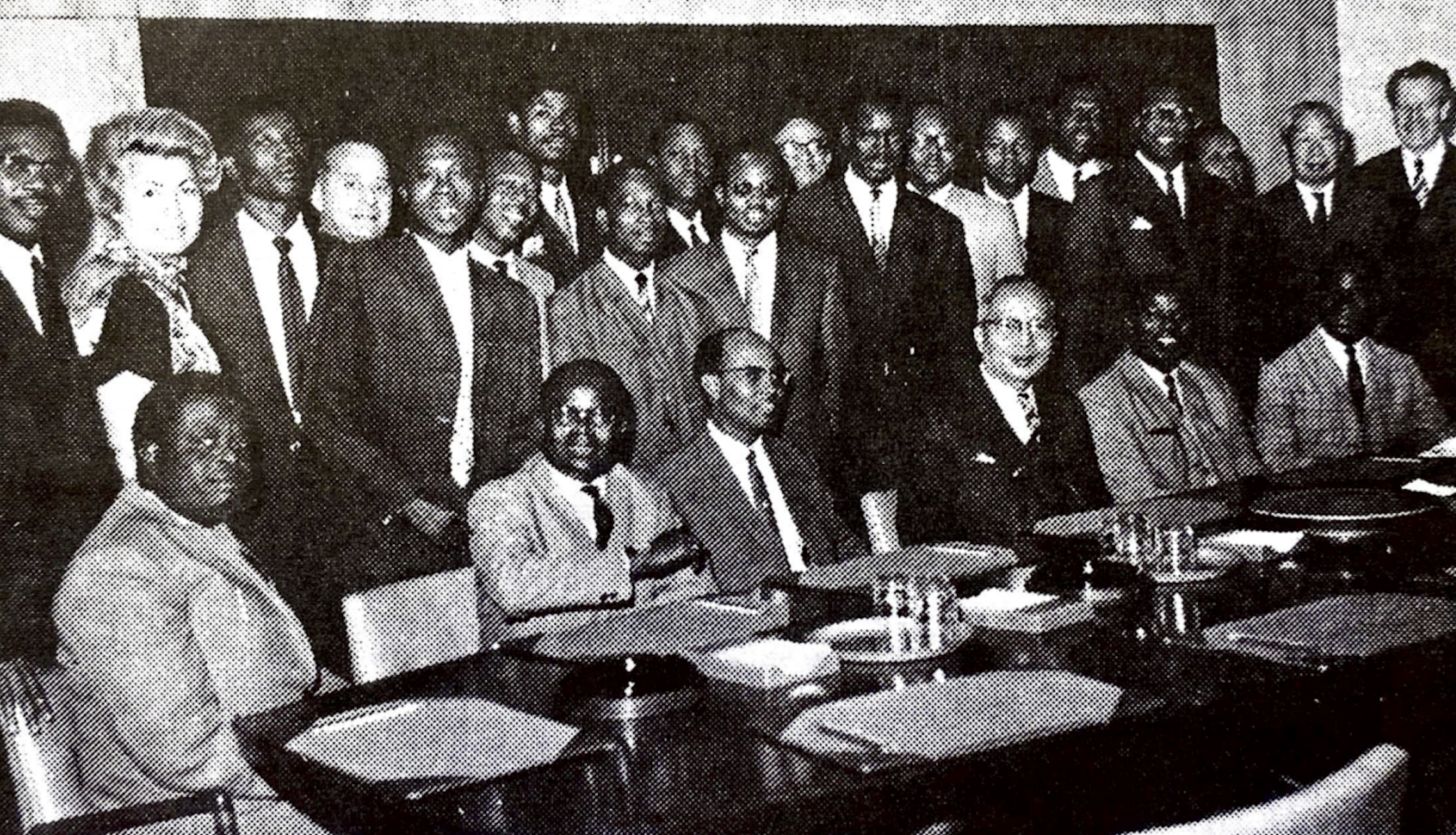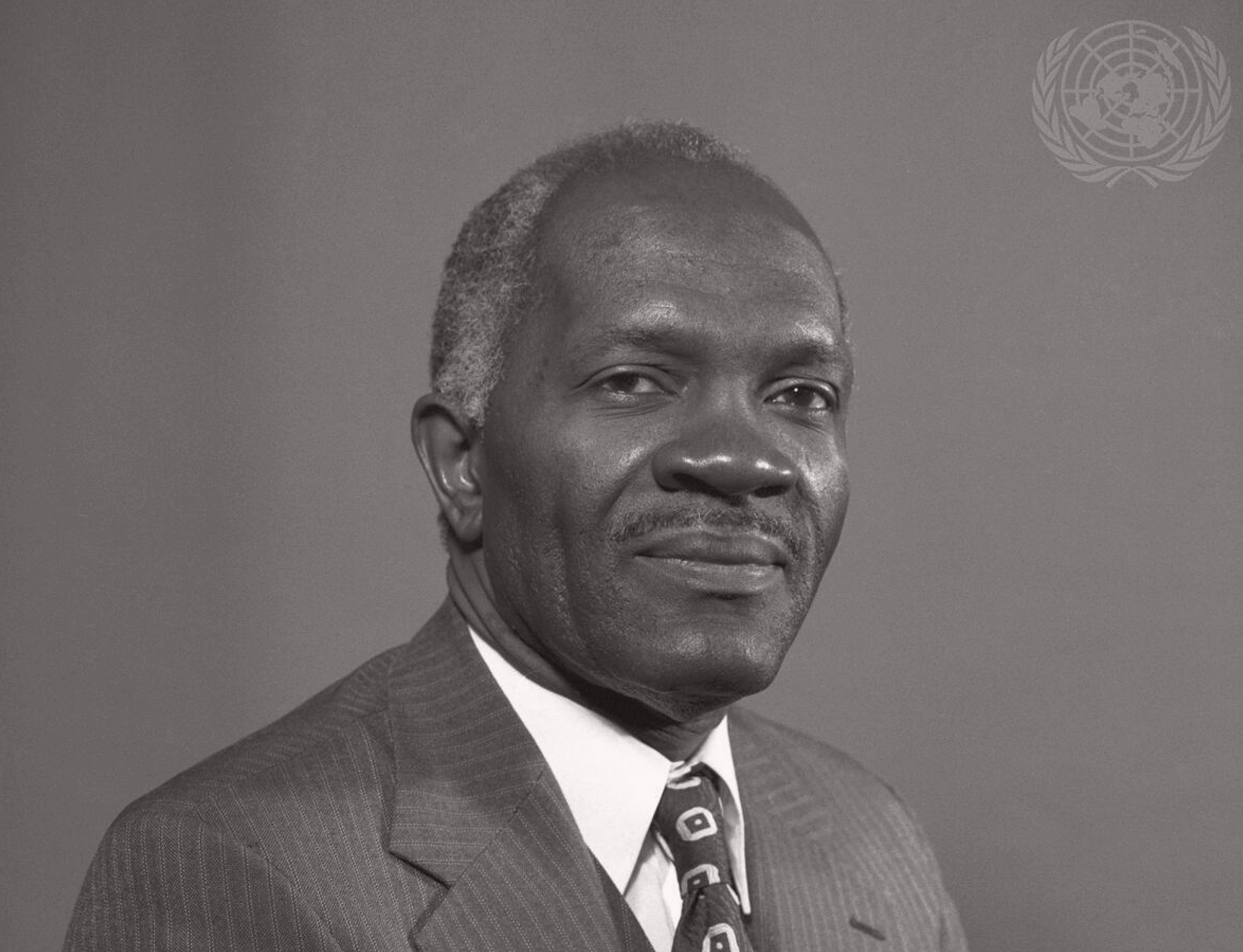Unveiling Six Decades of Growth:
Celebrating UNITAR's Inspiring Milestones
1963 to 2023


UNITAR was established with the aim of enhancing the effectiveness of the United Nations through training and research. It operated independently within the UN system.
Regional training seminars were established in parts of Africa and the Caribbean. Fellowship programmes for junior and senior diplomats were launched.
UNITAR held a meeting with world experts in Bellagio, Italy, to establish a new research agenda, with a focus on peacekeeping.
 "A typical training seminar - this one devoted to development and finance -
in 1967.
The late General Secretary U Thant is seated, third from right."
"A typical training seminar - this one devoted to development and finance -
in 1967.
The late General Secretary U Thant is seated, third from right."
Regional training seminars were established in parts of Africa and the Caribbean. Fellowship programmes for junior and senior diplomats were launched.
 Chief S.O. Adebo is seen here in his office at the Institute.
Chief S.O. Adebo is seen here in his office at the Institute.
UNITAR expanded its training activities under the leadership of Chief S.O. Adebo of Nigeria, including the establishment of regional training seminars and the launch of fellowship programmes for diplomats.
A European office in Geneva was opened, under Richard Symonds.
 Portrait of Mr. Davidson Nicol, Executive Director of the United Nations
Institute
for Training and Research (UNITAR).
Portrait of Mr. Davidson Nicol, Executive Director of the United Nations
Institute
for Training and Research (UNITAR).
During the tenure of Dr. Davidson Nicol of Sierra Leone as the Executive Director, UNITAR's activities continued to expand, with a focus on research efforts and the publication of reports on various UN-related topics such as the New International Economic Order (NIEO) and alternative energy sources.
Under the Michel Doo-Kingue of Cameroon as the Executive Director, UNITAR faced financial challenges and underwent restructuring to streamline its programmes and focus on training in international cooperation and multilateral diplomacy.
An independent report commissioned by the General Assembly advocated for the reform and continuation of UNITAR's activities, leading to the transfer of its headquarters from New York to Geneva.
 UNITAR Workshops
UNITAR Workshops
UNITAR launched major training programmes in collaboration with the World Bank, the United Nations Environment Programme (UNEP), and other partners, focusing on areas such as debt management, environmental resource management, peacemaking, and preventive diplomacy.
A UNITAR Office was reopened in New York, expanding the institute's programmes for delegates at the UN headquarters.
 Dr. Marcel Boisard
Dr. Marcel Boisard
During the tenure of Dr. Marcel Boisard of Switzerland as the Executive Director, UNITAR further strengthened its programmes, including training in support of United Nations programmes and partnerships with specialized agencies.
 UNITAR Hiroshima office
UNITAR Hiroshima office
In 2003, following three years of research and a pilot phase, UNITAR established its first office in Asia in the city of Hiroshima, the only UN presence in that symbolic city. Marking this year its 20th anniversary, the Hiroshima Office has built a stellar reputation for the quality and depth of its training, the power of its unique location, and its close ties to the community. Its programmes tend to build on what Hiroshima represents: peace, prosperity and resilience.
A project office was established in Port Harcourt, Nigeria, with a focus on training for civil servants and civil society in the Niger Delta region and neighboring countries in West Africa.
 Secretary-General Ban Ki-moon (right) meets with Carlos Lopes, Executive
Director of
the United Nations Institute for Training and Research (UNITAR) in Geneva,
Switzerland.
Secretary-General Ban Ki-moon (right) meets with Carlos Lopes, Executive
Director of
the United Nations Institute for Training and Research (UNITAR) in Geneva,
Switzerland.
Dr. Carlos Lopes of Gunia Bisau assumed the role of Executive Director and continued the consolidation of UNITAR's training programmes. During his tenure, UNITAR reached approximately 65,000 participants from 186 countries through workshops, courses, and e-learning initiatives. Sustainable development became a key focus area, and the Climate Change programmes expanded with training workshops and technical assistance.
 Secretary-General Ban Ki-moon (right) meets with Sally Fegan-Wyles,
Executive
Director of the UN Institute for Training and Research (UNITAR).
Secretary-General Ban Ki-moon (right) meets with Sally Fegan-Wyles,
Executive
Director of the UN Institute for Training and Research (UNITAR).
Sally Fegan-Wyles of Ireland was appointed as UN Assistant Secretary-General and Acting Head, Executive Director of UNITAR.
 Celebration of the 50th anniversary of the UN Institute for Training and
Research
(UNITAR)’s 50th at the UN Office at Geneva (UNOG), Palais des Nations.
Celebration of the 50th anniversary of the UN Institute for Training and
Research
(UNITAR)’s 50th at the UN Office at Geneva (UNOG), Palais des Nations.
UNITAR marked its 50th anniversary, commemorated by the signing of a Framework of
Cooperation between UNITAR and the G77 and China, Geneva Chapter. Within this
framework,
the G77 expressed its need for increased support from UNITAR in strengthening
the
capacities of its member nations.
In response, UNITAR reaffirmed its unwavering
commitment to assist G77 countries by enhancing their capacities in areas that
are
relevant to the United Nations.
 Secretary-General Ban Ki-moon (left) swears in Nikhil Seth as Executive
Director of
the UN Institute for Training & Research (UNITAR).
Secretary-General Ban Ki-moon (left) swears in Nikhil Seth as Executive
Director of
the UN Institute for Training & Research (UNITAR).
Nikhil Seth of India became the Executive Director of UNITAR. The Sustainable Development Goals (SDGs) and the 2030 Agenda were adopted in the UN General Assembly. UNITAR aligned its programmatic work under the pillars of Peace, People, Planet, and Prosperity, with a focus on SDG learning, UN Satellite Centre (UNOSAT), and diplomatic training.
The COVID-19 crisis spurred a technological shift in UNITAR, with face-to-face training transitioning to distance learning. The number of learners increased dramatically by nearly 400%. UNITAR continued to grow financially at a robust rate of 12% per year.
 UNITAR Bonn Office.
UNITAR Bonn Office.
UNITAR opened a new office in Bonn, Germany, and expanded the number of affiliated training centers from 14 to 32, spanning all continents. Partnerships with the private sector and academia were strengthened, leading to networks of universities and coalitions focused on multidisciplinary learning.
UNITAR marks its 60th anniversary. It embraces all pillars of the Agenda 2030 -
peace,
people, planet, and prosperity, and focuses on accelerating the implementation
of the
2030 Agenda, fostering multilateral diplomacy, and leveraging technology for
evidence-based decision-making.
The institute benefits 395,987 individuals
worldwide
through high-quality modern learning services, provides over 1,034 maps and
related
products to partners in various UN agencies and more than 70 countries through
the
United Nations Satellite Centre, and furthers knowledge dissemination on e-waste
through
SCYCLE Programme.
A favorable female-to-male gender ratio of beneficiaries is
maintained
for the third time in its history. Strong and committed partnerships are
established,
with 69% of events and 91% of beneficiaries resulting from collaborative
programming.
As we commemorate the remarkable journey of six decades, UNITAR looks eagerly towards the future,
where innovation and sustainable technologies intertwine to shape our evolving landscape. Our
commitment to providing knowledge that empowers leaders remains unwavering, as we embrace new
paradigms and harness cutting-edge tools to enhance our performance and deliver unrivaled
educational and training programmes.
UNITAR's activities are in a constant state of
adaptation,
mirroring the dynamic needs and emerging trends of the modern world. Guided by our steadfast
mission, we propel our learners forward, equipping likeminded individuals, diplomats and top
executives with the foresight, expertise, and global perspective to navigate a rapidly changing
global landscape.

 Photo by: Tima Miroshnichenko
Photo by: Tima Miroshnichenko
We foresee a future where innovation meets purpose, and where UNITAR continues to be a catalyst
for
positive change. All our efforts go into forging new horizons, embracing sustainable
technologies,
and fostering a resilient mindset that shapes a brighter tomorrow.
With an unwavering
dedication to advancing education and training, we are committed to not only addressing current
challenges but also anticipating future ones. By cultivating a culture of lifelong learning,
collaboration, and adaptability, UNITAR aims to empower individuals and organizations to thrive
in
an ever-evolving world. As we embark on this journey, we remain steadfast in our pursuit of
excellence and positive impact, driven by the belief that knowledge combined with action can
truly make positive change in the world.